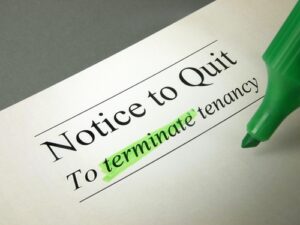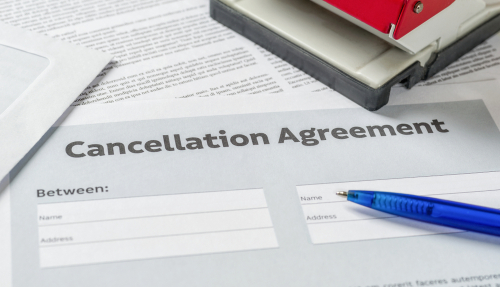What to Do When a Tenant Wants to Break a Lease

Contents of This Article:
- Importance of a Solid Lease Agreement
- Why Would a Tenant Break a Lease Agreement?
- How Can a Tenant Break Their Lease?
- What to Do When a Tenant Wants to Break a Lease
- Important Lease Tips for Landlords
Importance of a Solid Lease Agreement
Creating a solid lease agreement is a crucial part of the rental process. First, it serves as a legally binding document, establishing a framework that outlines the landlord’s and tenant’s rights and responsibilities. That said, a well-crafted rental agreement clearly explains the rules for living in a rental property and outlines things like the rent amount, the due date, and who’s responsible for repairs.
An excellent lease agreement also states the rules regarding when the lease starts and ends. Without a well-rounded lease, having a successful landlord-tenant experience throughout each tenancy is more complicated. Additionally, it may make things more difficult for landlords or Fairfax property managers if a tenant wants to break a lease early. To learn more about what happens when a tenant wants to break a lease, just keep reading.
Why Would a Tenant Break a Lease Agreement?
Tenants may have various reasons for breaking a lease agreement. However, there are usually only a few legal reasons a tenant may break their lease without penalty.
Legal Reasons to Break a Lease
- Health or Safety Code Violations- Landlords must maintain rentals to certain health and safety standards. If the rental violates any necessary health codes, tenants can break their lease early.
- Landlord Harassment or Tenant Privacy Violation- If tenants are facing harassment, threats, or violence, they have a legal right to leave the rental and break the lease.
- Active Duty Military- Under the Servicemembers Civil Relief Act, tenants may break their lease without penalty if they enter active military service. However, they must give at least 30 days’ notice and be deployed for no longer than 90 days.
- Victims of Domestic Violence or Abuse- Tenants who are victims of domestic violence or sexual abuse can move out of their rental immediately without consequence. However, they may have to provide written notice before leaving the property.

Even if you find yourself in one of the above scenarios, you usually still have to notify your landlord before leaving the property. That said, some tenants will try to get out of a lease agreement without a legal reason for doing so. So, here are some other reasons a tenant may try and break their lease.
Other Reasons for Breaking a Lease
- Job Relocation- A tenant may need to move for a new job or because their current job location changes, making it difficult to stay for the entire lease term.
- Financial Hardship- Sudden financial difficulties, like job loss or unexpected expenses, can make it challenging for some tenants to continue paying rent.
- Health or Personal Issues- Health problems or personal circumstances, like a family emergency or specialized medical treatment, might necessitate a move.
- Conflict With Neighbors- Ongoing disputes with neighbors or a difficult relationship with the landlord can create an uncomfortable living situation, pushing a tenant to leave.
- Purchasing a Home- If a tenant decides to buy a home during the lease term, they may need to break the lease to move into their new property.
How Can a Tenant Break Their Lease?
Depending on the reason your tenant wants to leave, they may break their lease in several ways. Sometimes, they may give you enough notice before leaving the property, while other times, they may leave without saying anything at all. Here are some of the common scenarios and how they may play out.
- Breaking the Lease With Some Notice
- Leaving Without Any Notice
- Breaking the Lease With Proper Notice
Breaking the Lease With Some Notice
If a tenant needs to vacate the property or relocate to another area for any given reason, they’ll likely need to give some notice before leaving. However, they may not always give you enough notice. Generally, it’s standard to require at least 30 days’ notice if a tenant plans to leave.

So, if your tenant brings up the idea of leaving the property, you’ll want to work with them to set up mutual terms and conditions. For instance, if you can get the property rented quickly, you may sign off with the tenant to end the agreement. However, if you want to hold them responsible for the rent until a new tenant moves in, it’s usually within your right as a landlord to do so.
Leaving Without Any Notice
You may have a tenant who decides to leave suddenly without giving any notice or way to contact them once they’re gone. If you wake up one day and your tenant is gone without any notice, there are a few important steps to take.
For instance, start by trying to contact the tenant via any contact information you have on file for them. If you cannot get ahold of them, try any emergency contacts they may have provided.
Breaking the Lease With Proper Notice
Per most lease agreements, tenants must give 30 days or more notice before leaving a rental property for good. Luckily, this should give you enough time to find a new tenant.
That said, in some instances, even with 30 days’ notice, the former tenant may be obligated to pay rent up until the end of the agreement, regardless of whether they’re gone from the unit or not. However, if you find a new tenant for occupying the property, you cannot continue collecting rent from the old tenant.
What to Do When a Tenant Wants to Break a Lease
If your tenant wants to break their lease, they may do so in a number of ways. That said, the amount of notice they give you or how they leave the property can affect your next steps and how you handle them breaking the lease.
- Review the Lease Agreement- Examine the lease agreement to understand the terms and conditions related to breaking the lease. Pay special attention to clauses regarding early termination, penalties, and notice requirements.

- Communicate With the Tenant- Have an open and honest conversation with the tenant to understand their reasons for wanting to break the lease. This can give more insight into possible solutions.
- Document Everything- Keep records of all communication with the tenant regarding the lease termination. This includes emails, letters, notes from phone conversations, or any agreements reached.
- Inspect the Property- Schedule a walkthrough of the property to assess the condition and discuss any necessary repairs or cleaning that may be required.
- Consider Possible Solutions- You may have a few different options when it comes to a tenant breaking their lease early. Here are a few different options to consider.
-
- Determine if the tenant can find a suitable replacement tenant who meets your criteria and is willing to take over the lease.
- Consider allowing the tenant to sublet the property if allowed by the lease agreement.
- Negotiate a mutual agreement for early lease termination, which may involve the tenant paying an agreed-upon fee or forfeiting their security deposit.
If you’re dealing with a tenant who wants to break their lease, it’s important to familiarize yourself with local laws and regulations regarding lease terminations. After all, providing a fair and clear path for lease termination can help maintain positive relations with tenants and minimize any potential legal issues.
Important Lease Tips for Landlords
The most important part of any landlord-tenant relationship is the lease agreement. After all, it states all of the rules and expectations for both landlords and tenants throughout the term of a tenancy. As such, it’s crucial for landlords and property managers to come up with comprehensive lease terms that meet the needs of tenants, landlords, and legal obligations.
If you need help finding quality tenants, drafting fair lease terms, and taking care of your rental properties, it may be time to hire property management services. Luckily, Bay Property Management Group can help! Our team of qualified professionals can help take your rental business to the next level. We provide a number of services, including tenant screening, rent collection, maintenance, inspections, and more. Contact BMG today to learn more about how we can help!



